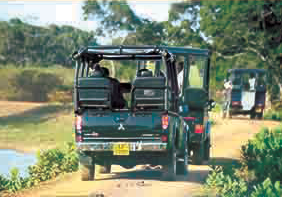"The fate of animals is of greater importance to me than the fear of appearing ridiculous; it is indissolubly connected with the fate of mean."
THE
VISITOR
CODE
Rules of the jungle


REPORT TO US
Are you a responsible visitor?
Yala is the most visited national park in Sri Lanka with record-breaking numbers every passing year. Now as you think of coming to the park, we have a question for you. Why? If the answer is because it sounds like a ‘fun’ thing to do, we want to help you make the answer and your experience much more meaningful and productive. Here’s a checklist of preparations
Don’t get on their nerves:
A quick lesson in animal behavior
"In all things of nature there is something of the marvelous."
It’s a jungle out there:
Infrastructure facilities
What to do in an emergency!
When you enter a national wildlife park you accept the risks involved. While animal attacks are rare, you must remember that they can happen. Animals are highly unpredictable, temperamental and may easily be provoked or spring to action without a warning. They are known to guard their herds and territories; with behavior different from one species to another. Elephants offer the highest risk while other predators may pose dangers at close range.
In case of an emergency, remind yourself to be calm and intently listen to the instructions of your trekker. If you are on your own, remain quiet, engine of vehicle cut and do not leave the vehicle at all.
In extremely dangerous situations, your trekker may ask you to put foot to the pedal; remember to keep calm and think rationally. Loud noise should be made only if trekker says so or when no other solution is in the offing, in the face of a violent, persistent attack, which is extremely remote and unlikely.
Your trekker is trained for any eventuality and will take you out of harm’s way. If you do not have a trekker, call for help if you need assistance if you are lost or need urgent help.
Through the eye of a leopard


